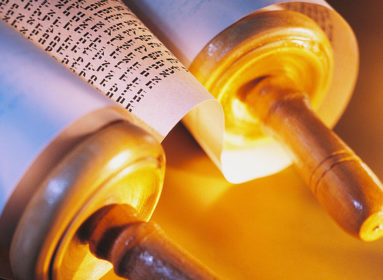Every spring, Jews around the world celebrate the holiday of Shavuot, a two-day holiday, beginning at sundown of the 5th of Sivan and lasting until nightfall of the 7th of Sivan. Meaning “weeks,” Shavuot marks the completion of the seven-week counting period that began with Passover.
Shavuot is a time in which we celebrate and renew our acceptance of the Torah, which was given to the Jewish people on Mount Sinai more than 3300 years ago – a moment our sages have compared to a wedding between God and the Jewish people. Shavuot also means “oath” and on this day God swore eternal devotion to us, and we in turn pledged everlasting loyalty to Him.
Like all Jewish holidays, Shavuot is associated with a number of laws and customs. Here are a few:
• Study Torah…all night – It is customary to stay up all night learning Torah on the first night of Shavuot (Tuesday night, May 18). One explanation for this tradition is that the Jewish people did not rise early on the day G-d gave the Torah, and it was necessary for G-d Himself to awaken them. To compensate for their behavior, Jews have accepted upon themselves the custom of remaining awake all night.
• Hear the Ten Commandments – Since all Jews stood at Mount Sinai, we reaffirm our covenant with God and His Torah by going to synagogue on the first day of Shavuot (Wednesday, May 19) to hear the reading of the Ten Commandments.
• Read the Book of Ruth – The Book of Ruth is read on the second day of Shavuot. There are several reasons for this custom: (1) Shavuot is both the birthday and yahrtzeit of King David, and the Book of Ruth records his ancestry. Ruth and her husband Boaz were King David’s great-grandparents; (2) The scenes of harvesting described in the book of Ruth are appropriate to Shavuot, which is also known as the Festival of Harvest; (3) Ruth was a sincere convert who embraced Judaism with all her heart. On Shavuot all Jews were converts – having accepted the Torah and all of its precepts.
• Eat dairy foods – It is customary to eat dairy foods on the first day of Shavuot. One reason: With the giving of the Torah the Jews became obligated to observe the laws of kashrut. As the Torah was given on Shabbat, no cattle could be slaughtered nor could utensils be koshered, and thus on that day they ate dairy. Another reason: The Torah is likened to nourishing milk. Also, the Hebrew word for milk is “chalav.” When the numerical value of each of the letters in the word “chalav” are added together – 8, 30, 2 – the total is forty. Forty is the number of days Moses spent on Mount Sinai when receiving the Torah.
• Adorn the house with flowers and greenery – Since Shavuot is also called the “Harvest Festival,” it is customary to adorn the home and synagogue with fruits, flowers and greens. Furthermore, our sages say that, although Mount Sinai was situated in a desert, when the Torah was given the mountain bloomed and sprouted flowers.
• Observe the laws of Yom Tov – On Shavuot we observe the basic laws of any Yom Tov, or holy day: We enjoy two meals on every day of Yom Tov-one at night and another during the daytime; we wear new or special clothing; we don’t use electrical appliances, go to work, handle money or write. Unlike Shabbat, however, on Yom Tov we are permitted to cook and bake, lighting a fire from a pre-existing flame.
The information in this article is from www.chabad.org.







 Southern New England Jewish Ledger
Southern New England Jewish Ledger















Comments are closed.